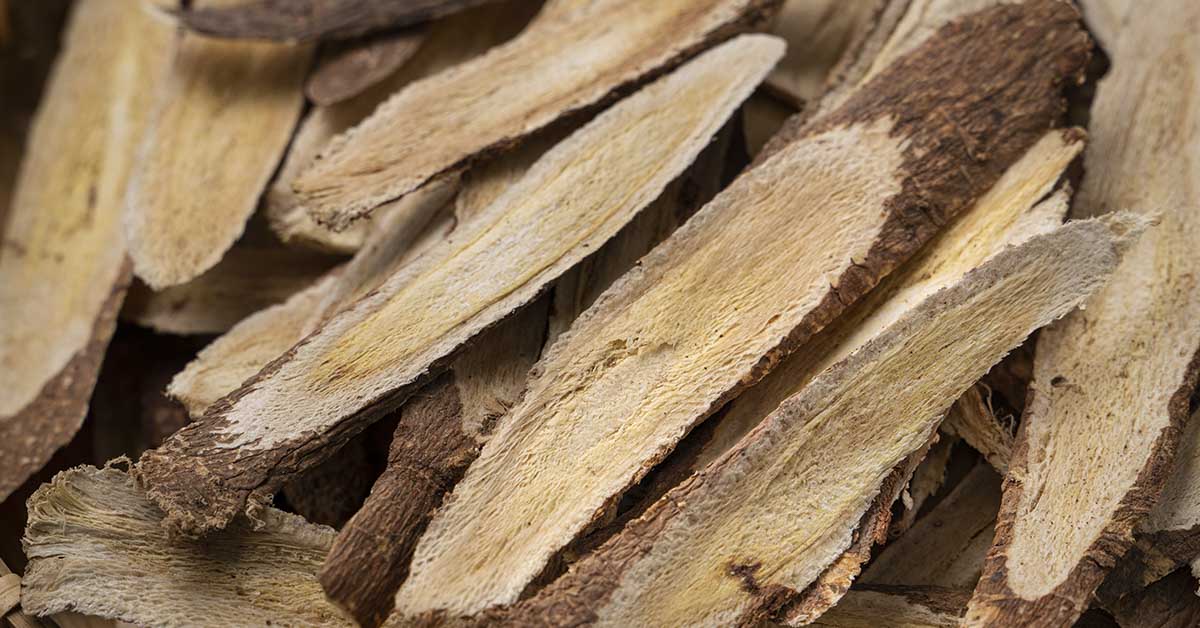Astragalus, also known as huáng qí or milkvetch, is most commonly known for its use in traditional Chinese medicine. It’s a plant that has been used since ancient times to treat a variety of ailments and is still commonly used today. There are many claims online about its supposed benefits, but these are the few that actually have some evidence to support them.
What Is Astragalus?
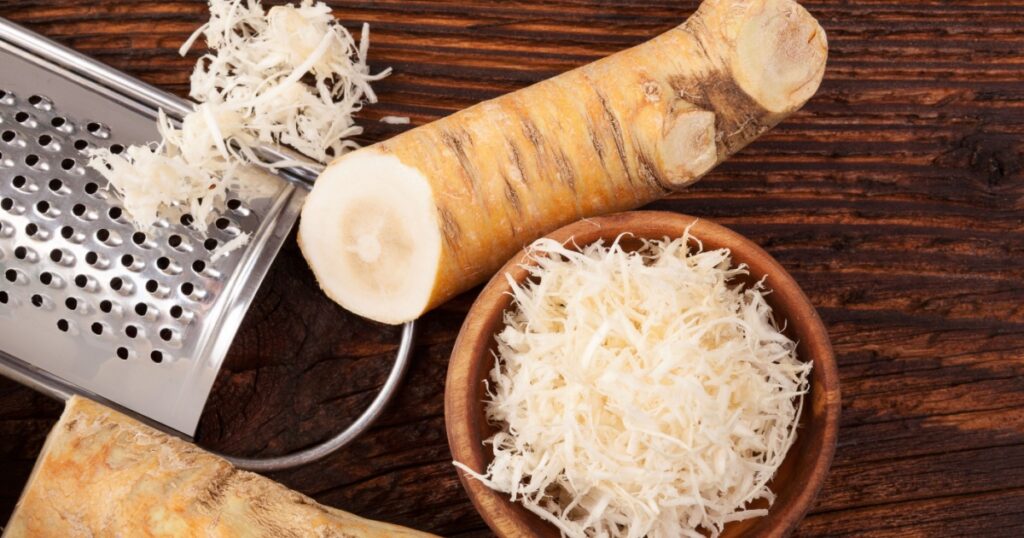
Before we dig into its benefits, it’s important to understand what Astragalus actually is. As already mentioned, it is a plant native to Asia. Astragalus comes from the root of the plant, which is made into many different forms of supplements, including liquid extracts, capsules, powders, and teas. Only two of the more than 2,000 species of Astragalus are used in supplements: Astragalus membranaceus and Astragalus mongholicus. (1)
Read More: The Top 10 Medicinal Plants and Herbs for Your Health
We love St. Francis Herb Farm Astragalus. Astragalus is used in traditional herbalism to help maintain a healthy immune system. It is used to manage colds and upper respiratory infections, to strengthen and regulate the immune system, and to increase the production of white blood cells. It is also an antibacterial, antiviral tonic, liver protectant, anti-inflammatory, and antioxidant. Get your 30 day supply at The Health Shop for $32.18 while supplies last
The Health Benefits of Astragalus
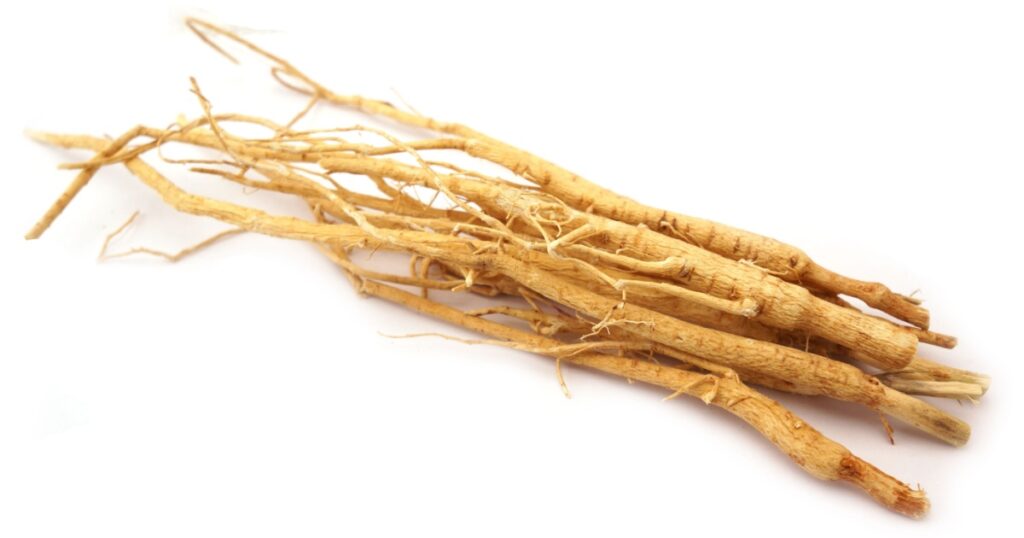
The root of Astragalus contains many active plant compounds, which are believed to be responsible for its potential benefits. Some of these compounds have been studied to determine their effects on humans. Here are eight benefits of Astragalus:
1) May Boost Your Immune System

The immune system is the body’s defense against all types of invaders, including bacteria and viruses, which can cause infections. Astragalus seems to work by increasing activity in certain white blood cells called lymphocytes and macrophages, which are key players in the immune system. Animal studies have shown that it can help to kill bacteria and viruses in mice. Other, though limited, research shows that it may help fight viral infections in humans, such as liver infections and even the common cold. (2, 3, 4, 5)
2) May Improve Heart Function

Astragalus can help reduce high blood pressure and heart disease by improving how your heart works. It does this by potentially widening your blood vessels, therefore increasing the amount of blood your heart can pump. Studies on patients with heart failure, however, showed no results. (6, 7)
3) May Help with Side Effects of Chemotherapy

Astragalus may help to reduce some of the side effects of chemotherapy and radiation therapy. In one study, it was shown to reduce nausea, vomiting, and fatigue among cancer patients who received chemotherapy. (8)
4) May Help Control Blood Sugar Levels

Astragalus may help improve blood sugar levels, which can benefit those with type 2 diabetes. In fact, it is the most frequently prescribed herb to help with Diabetes management in China. (9)
Read More: How to Plant a Garden that Can Help Supply You With Food Year All Year
5) May Improve Kidney Function
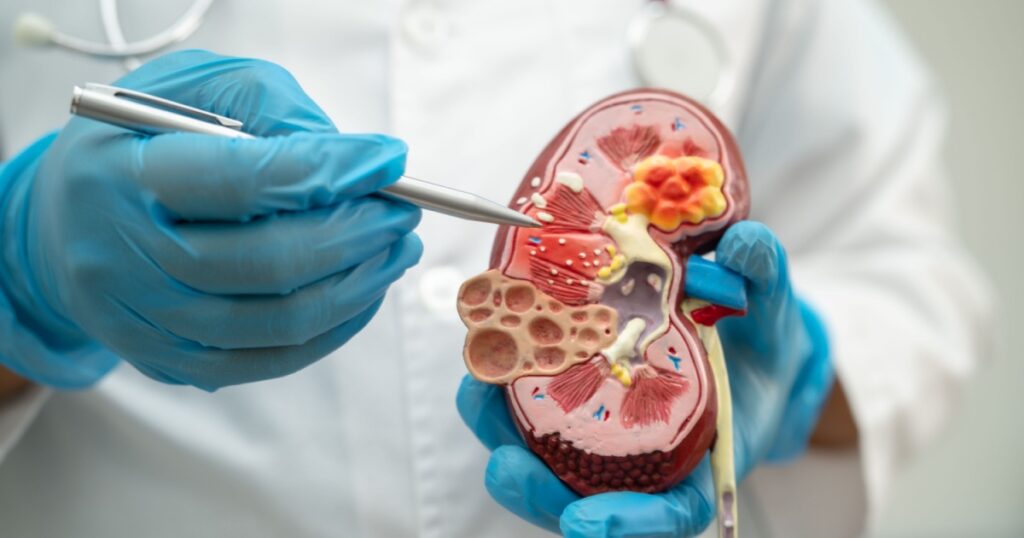
Researchers have found that Astragalus may support kidney health by improving blood flow and markers such as protein in the urine. A condition called proteinuria is characterized by high amounts of protein in the urine. This signifies that the kidneys are damaged or not working as they should be. Astragalus has been shown to help lower this. (10) Further, in animal studies, the herb has been shown to decrease inflammation and support the kidneys during sepsis, a potentially fatal infection. However, this has only been tested in animals, and more studies in humans are needed. (11)
We love St. Francis Herb Farm Astragalus. Astragalus is used in traditional herbalism to help maintain a healthy immune system. It is used to manage colds and upper respiratory infections, to strengthen and regulate the immune system, and to increase the production of white blood cells. It is also an antibacterial, antiviral tonic, liver protectant, anti-inflammatory, and antioxidant. Get your 30 day supply at The Health Shop for $32.18 while supplies last
Other Potential Effects with Only Preliminary Studies
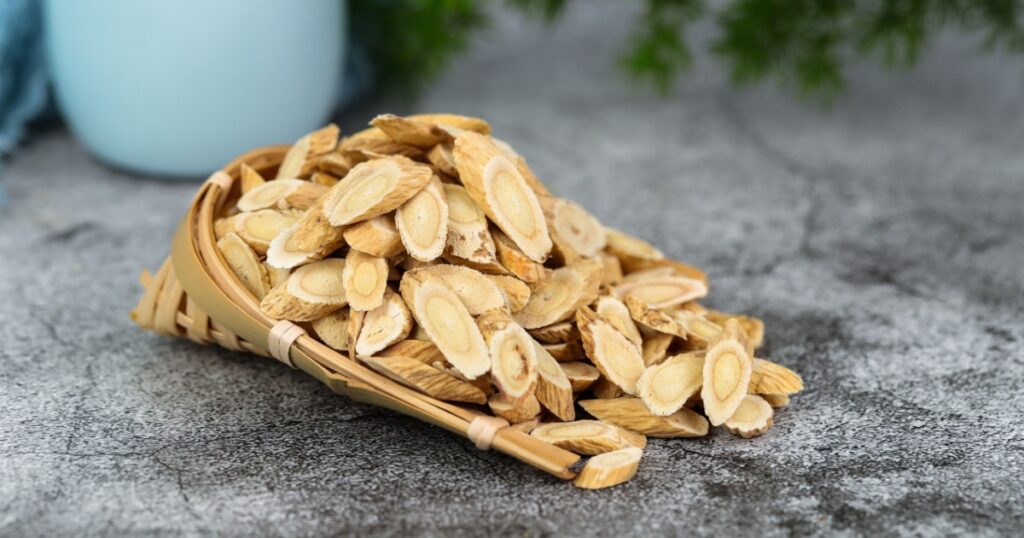
There are some other potential benefits. However, these are only in the very preliminary stages of research. These include:
1) Improved Symptoms of Chronic Fatigue: Chronic fatigue syndrome is a debilitating condition that can cause extreme fatigue, difficulty concentrating, and sleeping problems. Astragalus has been shown to improve these symptoms in some studies, although more research is needed to determine its effects on people with chronic fatigue. (12)
2) Anti-cancer Effects: In test tube studies, Astragalus has been shown to promote programmed cell death in cancer cells. Further testing is required. (13)
3) Improved Seasonal Allergies: One clinical study found that this herb can help alleviate allergy symptoms. In particular, it may reduce runny nose and sneezing. This is only one study, however, and more needs to be done in order to confirm these effects. (14)
Read More: Why Burdock Roots Are the Most Important Part of the Plant
How To Take Astragalus
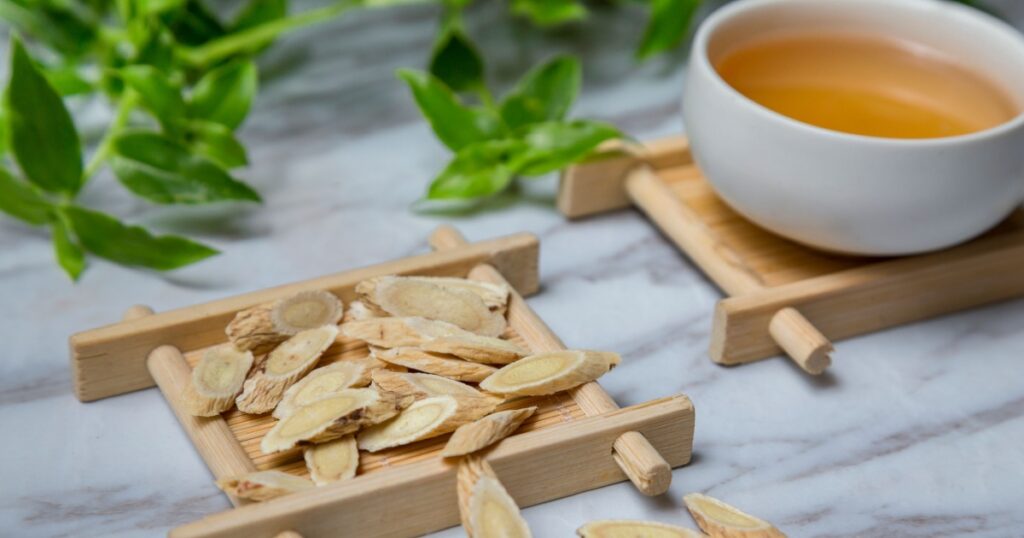
You can take Astragalus as a tea or in liquid or capsule form. An exact dosage has not been set, as it likely depends on the individual and the purpose. There can be some side effects, so always speak with your healthcare provider before using it.
It is well tolerated by most people. However, some side effects have been shown, such as rash, itching, nausea, and diarrhea. There is not currently enough research on its safety with pregnant or breastfeeding women. Because Astragalus may increase immune system activity, people with autoimmune diseases should be more cautious. The same goes for those taking immunosuppressant drugs, as this herb can lessen its effect.
We love St. Francis Herb Farm Astragalus. Astragalus is used in traditional herbalism to help maintain a healthy immune system. It is used to manage colds and upper respiratory infections, to strengthen and regulate the immune system, and to increase the production of white blood cells. It is also an antibacterial, antiviral tonic, liver protectant, anti-inflammatory, and antioxidant. Get your 30 day supply at The Health Shop for $32.18 while supplies last
The Bottom Line
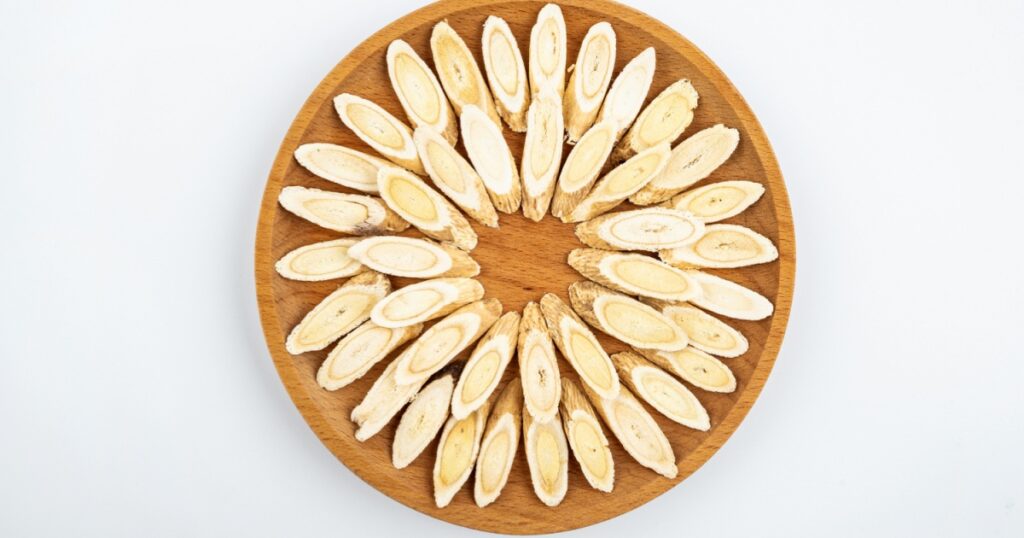
Astragalus has much potential to improve health. As always, with any supplement, you should speak with your healthcare provider first and take new supplements with caution. Monitor yourself, and if you notice adverse symptoms, stop taking them immediately and speak with your health care provider.
Read More: The rare plants that ‘bleed’ nickel
Sources
- “Astragalus.” Examine
- “Immune system effects of echinacea, ginseng, and astragalus: a review.” NCBI. Keith I Block and Mark N Mead. September 2003.
- “Saponin fraction from Astragalus membranaceus roots protects mice against polymicrobial sepsis induced by cecal ligation and puncture by inhibiting inflammation and upregulating protein C pathway.” NCBI. Xing-hua Gao, et al. October 2009.
- “Astragalus membranaceus. Monograph.” NCBI. Feberuary 2003.
- “Clinical and experimental effectiveness of Astragali compound in the treatment of chronic viral hepatitis B.” Pubmed. L L Tang, et al. May-June 2009.
- “Study of the Effects of Total Flavonoids of Astragalus on Atherosclerosis Formation and Potential Mechanisms.” NCBI. Deqing Wang, et al. January 2012.
- “[Effect of Astragalus injection on plasma levels of apoptosis-related factors in aged patients with chronic heart failure].” NCBI. Jin-guo Zhang, et al. September 2005.
- “[Clinical study on effect of Astragalus in efficacy enhancing and toxicity reducing of chemotherapy in patients of malignant tumor].” NCBI. Ping Duan and Zai-mo Wang. July 2002.
- “Recent Advances in Astragalus membranaceus Anti-Diabetic Research: Pharmacological Effects of Its Phytochemical Constituents.” NCBI. Kojo Agyemang, et al. November 2013.
- “Astragalus (a traditional Chinese medicine) for treating chronic kidney disease.” NCBI. Hong Wei Zhang, et al. October 2014
- “Astragalus polysaccharide protects sepsis model rats after cecum ligation and puncture.” NCBI. Jun Li, et al. October 2022.
- “Astragalus (a traditional Chinese medicine) for treating chronic kidney disease” NCBI. Hong Wei Zhang, et al. October 2014.
- “[Effects of Astragalus polysaccharide on proliferation and Akt phosphorylation of the basal-like breast cancer cell line].” NCBI. Mei-na Ye, et al. December 2011.
- “Efficacy and safety of Astragalus membranaceus in the treatment of patients with seasonal allergic rhinitis.” NCBI. Zinka Matkovic, et al. February 2010.
